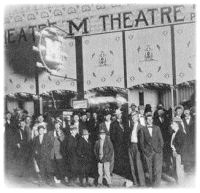Writing for Vaudeville
by Brett Page

Foreword
Can you be taught how to write for vaudeville? If you have the native gift, what experienced writers say about its problems, what they themselves have accomplished, and the means by which it has been wrought, will be of help to you. So much this book offers, and more I would not claim for it.
Although this volume is the first treatise on the subject of which I know, it is less an original offering than a compilation. Growing out of a series of articles written in collaboration with Mr. William C. Lengel for The Green Book Magazine, the subject assumed such bigness in my eyes that when I began the writing of this book, I spent months harvesting the knowledge of others to add to my own experience. With the warm-heartedness for which vaudevillians are famous, nearly everyone whose aid I asked lent assistance gladly. “It is vaudeville’s first book,” said more than one, deprecating the value of his own suggestions, “and we want it right in each slightest particular.”
To the following kindly gentlemen I wish to express my especial thanks: Aaron Hoffman, Edwin Hopkins, James Madison, Edgar Allan Woolf, Richard Harding Davis–the foremost example of a writer who made a famous name first in literature and afterward in vaudeville–Arthur Hopkins, Taylor Granville, Junie McCree, Arthur Denvir, Frank Fogarty, Irving Berlin, Charles K. Harris, L. Wolfe Gilbert, Ballard MacDonald, Louis Bernstein, Joe McCarthy, Joseph Hart, Joseph Maxwell, George A. Gottlieb, Daniel F. Hennessy, Sime Silverman, Thomas J. Gray, William C. Lengel, Miss Nellie Revell, the “big sister of vaudeville,” and a host of others whose names space does not permit my naming again here, but whose work is evidenced in the following pages. To Alexander Black, the man who made the first picture play twenty-one years ago, I owe thanks for points in the discussion of dramatic values. And for many helpful suggestions, and his kindly editing, I wish to express my gratitude to Dr. J. Berg Esenwein. To these “friends indeed" belongs whatever merit this book possesses.
BRETT PAGE
BROOKLYN, NEW YORK
August 25, 1915
 Continue...
Continue...![[Buy at Amazon]](http://images.amazon.com/images/P/1421900653.01.MZZZZZZZ.jpg)